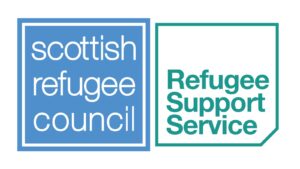Henry is one of our amazing volunteers who helps deliver our Refugee Support Service. Despite having three master’s degrees and a PHD, Henry isn’t allowed to work because he is still in the asylum process. Instead, he draws on his personal experience of seeking safety in Scotland to support people facing homelessness and destitution.
We caught up with him to find out more.
 I work with people who have had their asylum claims rejected. Many don’t receive any financial support and are living in extreme poverty. It can be very challenging for them because their lives are so restricted. They can’t access basic services [like benefits, social care and homelessness support] that are available to other people they know.
I work with people who have had their asylum claims rejected. Many don’t receive any financial support and are living in extreme poverty. It can be very challenging for them because their lives are so restricted. They can’t access basic services [like benefits, social care and homelessness support] that are available to other people they know.
Welfare checks are very central to what I do. I call people to find out how they’re doing. Do they have a GP? Do they have access to meals, housing or shelter? Do they have difficulties with finding a dentist or optician?
Often, it’s a case of helping people find the right forms and fill in those forms so they can receive the basic support that everyone should be entitled to.
Because I’m in the asylum system, I feel connected to these issues. I’ve had some very painful experiences myself and I understand what it’s like. When I’m having conversations with clients, they hear that I sound like them, and it makes them a bit more relaxed. They open up and want to talk. I won’t ever get compassion fatigue. No matter how many times I hear it, it’s still very fresh.
When you take a phone call and hear real stories and experiences, it’s a reminder that whatever you’re going through, or went through, you’re not alone. There are other people going though it and there are people who want to help.
We see every person we work with as a human in a difficult situation. What I find most challenging is when it feels like the Home Office and other authorities don’t see the human. They just see the files and the reference numbers.
For example, a person might have lost their ASPEN card [containing their weekly allowance for basics like food and other essentials]. They’re crying and they’re hungry and the authorities just tell them it’ll take 10 days to send a new one. What is that person meant to do in the meantime?
The hostile environment is very ill thought out. It just makes society worse off. We come up against so many challenges that don’t need to be there. You do your best, but there are times when you hit brick walls. It’s painful.
I have a client that is trying to get admitted to a barbering course. We’ve been able to find the course and apply for him, but he needs an ESOL [English for Speakers of Other Languages] Level 2 certificate. He speaks English well and I’m sure once he gets assessed by an ESOL provider he’d get his certificate. But ESOL is so oversubscribed he can’t get an appointment until April next year.
This person is broken. He has no access to public funds, nothing. I had a meeting with him last week and he said: “If I don’t get up from my bed, I’m going to die here.” That course is everything to him and he’s going to have to wait until next year.
It can be challenging, but if you focussed on what you’re not able to do, every day would be a bad day. I find fulfilment in what I am able to do and the people I’m able to help. When you can make a difference and help someone it’s so rewarding.
I had someone come to me with toothache and they were in so much pain. They had heard that it could take four months to get a dental appointment. I called the dental hospital, and they said he could come in immediately. He had his tooth extracted that day. When he was thanking me afterwards, he teared up. It didn’t take me 10 minutes to make that appointment for him, but it made such a difference. Just one phone call could alleviate that pain.
Being a volunteer is such a positive experience. For me, it’s an opportunity to contribute. Just being useful in an environment where the authorities are trying to make you useless is so rewarding.
It’s changed my career path. I had always planned to do something in academia. Now I want to work in the charity sector and help make technology more accessible for marginalised and underserved communities.
If someone told me they were thinking about volunteering with Scottish Refugee Council, I’d say definitely do it! There’s no question. I’ll keep doing it, even when I’m settled.
I feel really supported by the Scottish Refugee Council team. They are all just wonderful people. Even when you think you’re not doing enough, they make you feel like you’re doing so much.
Our Refugee Support Service is here for everyone who needs our help, wherever in Scotland they are based. Find out more.
Learn more about support for people facing homelessness and destitution.
Volunteers like Henry make a vital contribution to all aspects of our work. We hold regular information sessions to help refugees and people in the asylum system learn about volunteering opportunities in Scotland. Find out more.
Photos by Angela Catlin for Scottish Refugee Council

